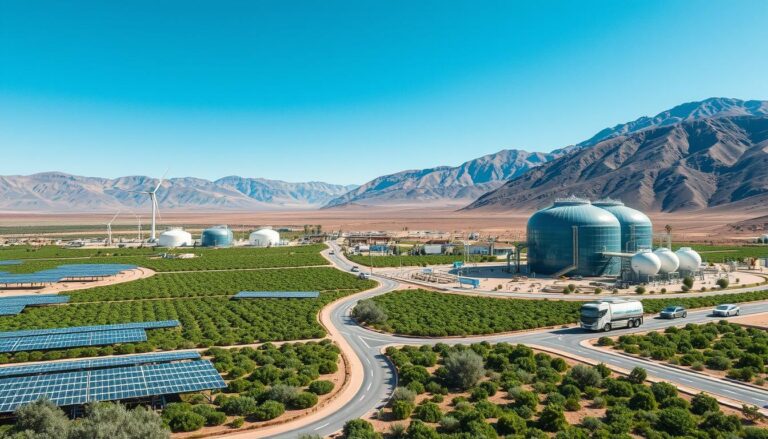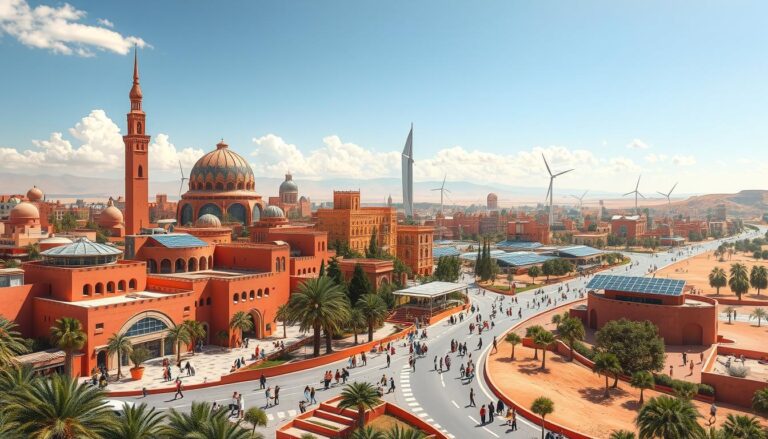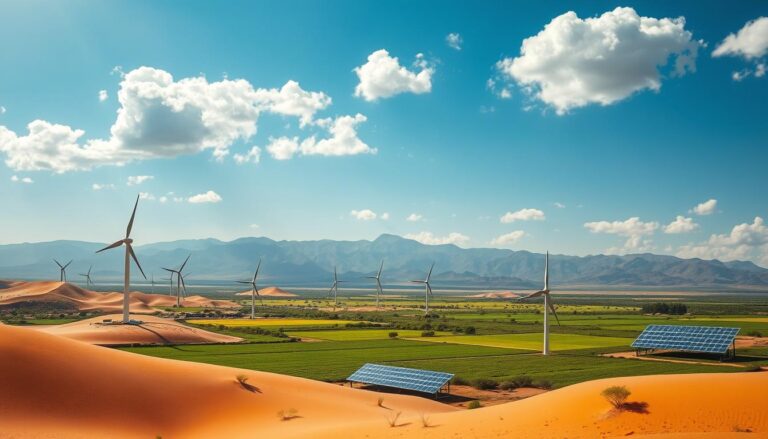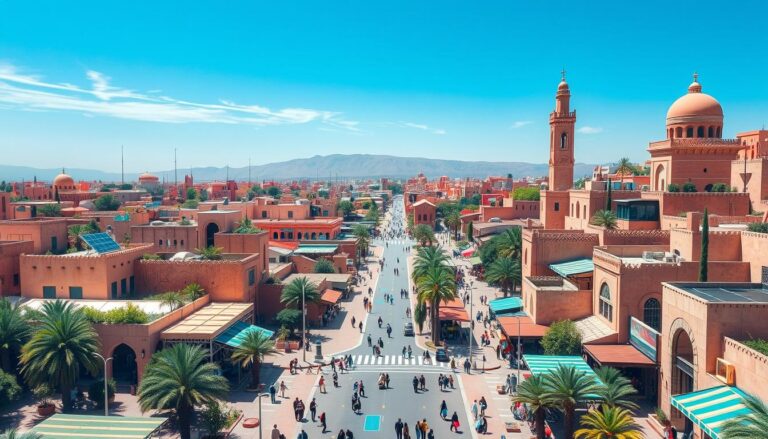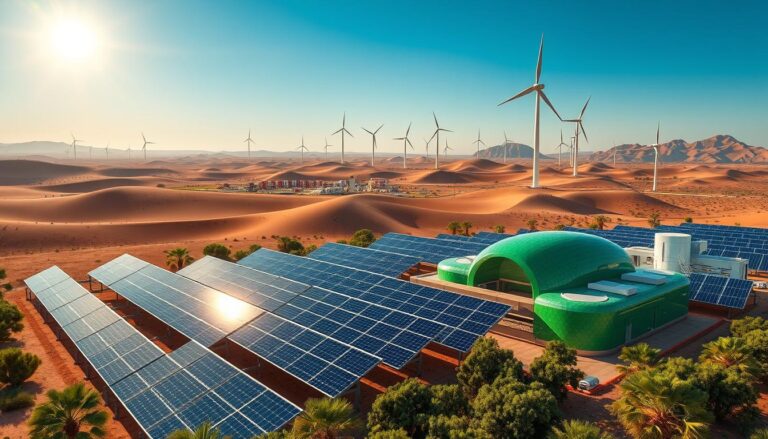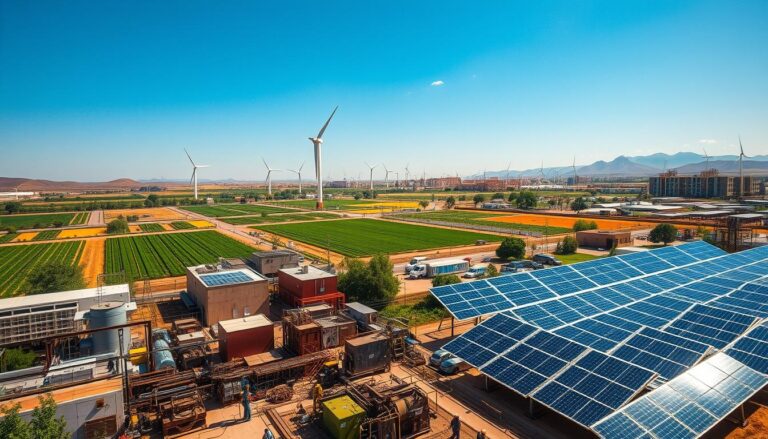Are you curious about the hidden wealth deep within Morocco’s mining sector? Look no further, as this article explores the abundant resources and economic impact of the industry.
With a diverse range of mineral reserves, including vast phosphate deposits, Morocco stands as one of the world’s leading mining destinations.
Beneath the surface lies an abundance of phosphate reserves that have propelled Morocco to become the largest exporter and producer of phosphates globally. These rich deposits have not only provided valuable resources for agricultural fertilizers but also contributed significantly to Morocco’s economy.
The mining sector has played a pivotal role in driving economic growth and development, attracting foreign investment, and creating employment opportunities for thousands across the country.
From its vast reserves to its strategic location near international markets, Morocco’s mining sector presents immense potential for continued growth and prosperity.
Key Takeaways
- Morocco is the largest exporter and producer of phosphates globally, with approximately 75% of the world’s phosphate reserves.
- The mining sector in Morocco contributes significantly to the country’s economic growth and development, accounting for around 10% of its GDP.
- Morocco’s mining sector has implemented advanced extraction technologies and underground mining methods to replace traditional open-pit mining.
- Sustainable practices, such as responsible waste management and resource conservation, are crucial in minimizing the ecological impact of mining activities in Morocco.
Morocco’s Abundance of Phosphate Reserves
You’ll be fascinated to learn about Morocco’s abundant reserves of phosphate, which play a pivotal role in the country’s thriving mining sector.
Phosphate is a vital mineral used primarily in agricultural fertilizers and plays a crucial role in global food production.
With approximately 75% of the world’s phosphate reserves, Morocco stands as the leading exporter of this valuable resource.
Phosphate mining techniques in Morocco have evolved over time to meet increasing demand while minimizing environmental impact.
Traditional open-pit mining methods were initially employed, but with growing concerns over land degradation and water pollution, new approaches have been adopted.
These include underground mining and advanced extraction technologies that aim to reduce the ecological footprint associated with phosphate extraction.
Despite efforts to minimize negative environmental impacts, concerns remain surrounding phosphate mining in Morocco.
One major issue is the excessive use of water resources for washing and processing raw ore.
This has led to water scarcity problems in some regions, impacting local communities and ecosystems alike.
Additionally, the disposal of waste by-products from phosphate processing can pose risks to nearby water bodies if not properly managed.
Moving on from its abundance of phosphates, Morocco boasts a diverse range of mineral resources that contribute significantly to its mining sector.
From precious metals like gold and silver to industrial minerals such as zinc and lead, the country possesses a wealth of untapped potential beneath its surface.
Expanding exploration activities are constantly uncovering new deposits, attracting both domestic and foreign investment into this promising industry.
By delving into Morocco’s abundant reserves of phosphates and their impact on the country’s mining sector, you gain insight into one aspect of its rich mineral wealth story.
However, it’s important to recognize that phosphates are just one piece of the puzzle; there is much more beneath the surface waiting to be explored.
Diverse Range of Mineral Resources
Explore the hidden treasures of Morocco’s underground, where a plethora of mineral resources awaits your discovery. The country isn’t just rich in phosphate reserves, but it also boasts a diverse range of other valuable minerals.
From lead and zinc to copper and cobalt, Morocco has an extensive exploration potential that continues to attract attention from mining companies around the world.
In this land of untapped potential, you’ll find an array of minerals waiting to be unearthed. Some of the most sought-after resources include manganese, which is essential for steel production, and barite, used in drilling fluids for oil and gas exploration.
Additionally, Morocco holds significant deposits of silver and gold, making it a promising destination for precious metal extraction. With such variety in its mineral wealth, the country offers ample opportunities for geological exploration and resource development.
However, as with any mining sector, there are environmental concerns that need to be addressed. Mining activities can have adverse effects on ecosystems if they aren’t properly managed. It’s crucial for mining companies operating in Morocco to prioritize sustainable practices that minimize their ecological footprint. This includes implementing measures to control pollution from mine tailings and ensuring proper land rehabilitation after extraction activities cease.
As we delve deeper into the economic impact of Morocco’s mining sector, it becomes evident that the diverse range of mineral resources plays a vital role in driving economic growth and development. The exploration potential allows for increased investment opportunities both domestically and internationally.
Moreover, the responsible extraction and processing of these minerals create employment opportunities for local communities while generating export revenue for the country.
Transitioning seamlessly into discussing the economic impact without explicitly stating ‘step,’ it’s clear that Morocco’s abundant mineral resources have far-reaching implications beyond their mere existence beneath the surface.
Economic Impact of the Mining Sector
The mining sector in Morocco has had a significant economic impact, particularly through the creation of jobs and generating revenue.
With the extraction and processing of various minerals, such as phosphates and precious metals, thousands of jobs have been created for locals.
This not only provides employment opportunities but also contributes to the overall economic growth and development of Morocco.
Additionally, the mining sector plays a crucial role in generating revenue for the country through exports and taxation, further contributing to its economic prosperity.
Creation of Jobs and Generating Revenue
Creating jobs and generating revenue, Morocco’s mining sector holds the potential to unearth a wealth of opportunities. The impact on local communities cannot be understated, as the sector provides employment for thousands of individuals across various skill levels.
From miners to engineers and support staff, these jobs not only contribute to the livelihoods of individuals but also stimulate economic growth in surrounding areas. Additionally, the mining sector generates significant revenue for Morocco through taxes and royalties paid by mining companies. This revenue can then be reinvested into infrastructure development, education, healthcare, and other public services, further enhancing overall societal well-being.
Furthermore, it is crucial to highlight the commitment of Morocco’s mining sector towards environmental sustainability. As mining operations continue to expand, there is a growing emphasis on responsible practices that minimize negative ecological impacts. Strict regulations are enforced to ensure proper waste management, resource conservation, and reclamation efforts.
By promoting sustainable mining practices, the sector aims to mitigate any potential harm caused by extraction activities while preserving natural resources for future generations.
With its positive impact on local communities and dedication to environmental sustainability, Morocco’s mining sector plays a vital role in contributing to the country’s economic growth and development. By creating employment opportunities and generating revenue through responsible practices, this industry serves as a catalyst for progress in various sectors of the economy.
Contribution to Morocco’s Economic Growth and Development
Uncover the untapped potential that lies within Morocco’s mining sector, and witness firsthand how it contributes to the country’s remarkable economic growth and development.
The mining industry in Morocco plays a crucial role in boosting the country’s GDP. With an abundance of mineral resources including phosphate, lead, zinc, copper, and gold, the sector has become a key contributor to Morocco’s economy. In fact, mining activities alone account for around 10% of the country’s GDP, making it a significant driver of economic growth.
To further strengthen its position in the global market, Morocco has implemented favorable government policies to attract foreign investment and encourage domestic exploration and production. These policies have resulted in increased job opportunities and revenue generation for both the government and private companies operating in the sector. Additionally, they have facilitated technological advancements in mining operations while ensuring environmental sustainability.
Engage with this thriving sector through these points:
- Mining activities contribute significantly to Morocco’s Gross Domestic Product (GDP).
- Favorable government policies attract foreign investments.
- Job creation and revenue generation are notable outcomes.
As we explore further into opportunities for growth and development within Morocco’s mining sector…
Opportunities for Growth and Development
In this discussion, we’ll explore the opportunities for growth and development in Morocco’s mining sector.
One key point to consider is the exploration and development of untapped mineral resources. This can lead to increased production and economic benefits.
Additionally, technological advancements in mining operations have the potential to improve efficiency, safety, and environmental sustainability in the industry.
Exploration and Development of Untapped Mineral Resources
With the untapped mineral resources of Morocco waiting to be harnessed, there’s a world of potential beneath the surface. The country’s vast and diverse geological landscape offers ample opportunities for resource exploration and development. Here are five key aspects that contribute to the untapped potential of Morocco’s mining sector:
-
Rich deposits: Morocco boasts a wealth of mineral resources that remain largely unexplored, from precious metals like gold and silver to industrial minerals like phosphates and zinc. These untapped deposits hold significant economic value and can provide a much-needed boost to the country’s economy.
-
Geological diversity: Morocco presents an array of geological formations that may harbor valuable minerals, thanks to its varied terrain ranging from mountains to deserts. Exploring these diverse landscapes can lead to the discovery of new deposits and expand the scope of mining operations in the country.
-
Strategic location: Morocco enjoys a strategic location at the crossroads between Europe, Africa, and the Middle East, making it an ideal hub for international trade. This advantageous position facilitates access to global markets for mined commodities, further enhancing the potential for growth in the mining sector.
-
Favorable investment climate: The Moroccan government has taken steps to attract foreign investment in its mining industry by implementing favorable policies and offering incentives. These measures encourage both local and international companies to explore and develop mineral resources in the country.
-
Sustainable practices: Morocco recognizes the importance of sustainable mining practices as global concerns about environmental impact increase. The adoption of environmentally friendly techniques ensures responsible resource extraction while minimizing ecological damage.
Transitioning into the subsequent section about technological advancements in mining operations, it’s evident that harnessing these untapped mineral resources requires innovative solutions.
Technological Advancements in Mining Operations
Get ready to be amazed by the incredible technological advancements revolutionizing mining operations today! The mining industry has undergone a significant transformation with the introduction of mining automation and remote monitoring. These cutting-edge technologies have not only improved efficiency but also enhanced safety in the sector.
Mining automation involves the use of advanced robotics and artificial intelligence to carry out various tasks that were once performed by humans. This technology allows for greater precision, productivity, and cost-effectiveness. With automated vehicles and machinery, mines can operate around the clock without risking human lives in hazardous conditions. Furthermore, remote monitoring systems enable real-time data collection and analysis from sensors placed throughout the mine. This not only provides valuable insights into operational performance but also facilitates predictive maintenance, reducing downtime and maximizing equipment utilization.
As we delve further into the challenges and sustainability in the mining sector, it is crucial to acknowledge how these technological advancements have paved the way for a safer and more efficient industry.
Challenges and Sustainability in the Mining Sector
Beneath the surface of Morocco’s mining sector lies a labyrinth of challenges that must be navigated for long-term sustainability. As the demand for minerals continues to rise, so does the need for sustainable practices in mining operations.
The environmental impact of mining cannot be ignored, and finding ways to mitigate it is crucial for the industry’s survival. One of the main challenges facing the mining sector is developing and implementing sustainable practices. Mining activities have a significant impact on the environment, from land degradation to water pollution. To ensure long-term sustainability, companies need to adopt technologies and techniques that minimize these negative effects. This includes using renewable energy sources, reducing water usage through recycling and conservation methods, and implementing responsible waste management strategies.
Another challenge is balancing economic growth with environmental preservation. While mining provides jobs and contributes to economic development, it also poses risks to ecosystems and natural resources. Striking a balance between extracting valuable minerals and protecting biodiversity requires careful planning and regulation. Governments play a vital role in setting standards and enforcing laws that promote sustainable mining practices.
Additionally, community engagement is crucial for sustainable mining operations. Local communities often bear the brunt of negative environmental impacts caused by mining activities. Engaging with these communities early on can help address their concerns, provide opportunities for dialogue, and ensure that their voices are heard throughout the decision-making process. It is essential to establish mutually beneficial relationships based on transparency, trust, and respect.
While Morocco’s mining sector holds immense potential for wealth generation, it also presents several challenges in terms of sustainability. Adopting sustainable practices that minimize environmental impact is vital for its long-term viability. Balancing economic growth with environmental preservation requires careful planning and regulation from both companies and governments alike. Furthermore, engaging with local communities is essential to address their concerns effectively. By navigating these challenges successfully, Morocco’s mining sector can unlock its riches while ensuring a more sustainable future for all stakeholders involved.
Conclusion
In conclusion, Morocco’s mining sector holds immense potential for economic growth and development. With its abundance of phosphate reserves and diverse range of mineral resources, the country has the opportunity to capitalize on these riches beneath the surface.
The impact of the mining sector on the economy cannot be underestimated, as it contributes significantly to GDP and provides employment opportunities for many.
However, it’s important to acknowledge that there are challenges and sustainability concerns in the mining sector. As demand for minerals continues to rise globally, there’s a need for responsible mining practices that prioritize environmental protection and social responsibility. Efforts should be made to ensure that extraction processes are conducted in a sustainable manner, minimizing negative impacts on local communities and ecosystems.
Investing in research and innovation can further enhance Morocco’s mining sector by improving efficiency, reducing environmental footprints, and exploring new mineral deposits. This will not only boost economic growth but also contribute to long-term sustainable development.
Overall, Morocco’s mining sector has great potential to unlock its hidden treasures beneath the surface. By addressing challenges and embracing sustainable practices, the country can continue to benefit from this valuable resource while safeguarding its environment for future generations.

The Editorial Team is a passionate group of Morocco enthusiasts dedicated to sharing the beauty, culture, and wonders of this captivating country. With diverse backgrounds and a deep love for travel, we strive to bring you engaging and informative content that inspires your Moroccan adventures. From uncovering hidden gems and sharing local insights to exploring mouthwatering cuisine and showcasing the vibrant lifestyle, our team is committed to providing you with valuable resources and exciting stories that enhance your exploration of Morocco. Join us on this journey as we celebrate the rich heritage and unforgettable experiences that make Morocco truly special.

